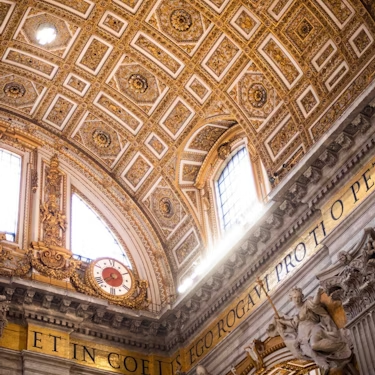More about: Sistine Chapel Tickets And Tours
The frescoes of the Sistine Chapel are one of the few artistic ensembles that seem out of time and space: when you look up to admire them you have the feeling of seeing something both ancient and modern and the awe is so great that you can only wonder how something so impressive could have been created.
It is part of the Vatican Museums, so to visit it you must purchase a ticket or take a guided tour of this museum. Read on to find out what options you have to visit one of the world's greatest artistic treasures and some tips to make the most of your visit.

Rome Vatican and Sistine Chapel Tickets + Sightseeing Bus Tour
With your tickets to the Vatican Museums you will also have access to the Sistine Chapel without waiting time
Forget the queues at the ticket office and secure your entrance at the best price to the Sistine Chapel with these tickets that give you priority access to the inside of the Vatican Museums.
Discover the hidden value of the Sistine Chapel with your skip-the-line tickets to the Vatican Museums. With all there is to see inside Rome's main attraction, you'll regret wasting time waiting in line to buy tickets at the box office. Therefore, my first recommendation is to book them in advance.
If you are one of those who prefer to go at your own pace to stop as long as you need in each of the artistic wonders that brings together the Vatican Museums, it is best to buy tickets without guides or groups. Once you get to the Sistine Chapel, inside the museum, you can contemplate without haste the impressive frescoes of "The Last Judgment" by Michelangelo.
Recommended if... Your stay in Rome is not very long, as the skip-the-line access will save you a lot of time that you can spend visiting other emblematic places.
How to buy tickets to visit the Sistine Chapel?
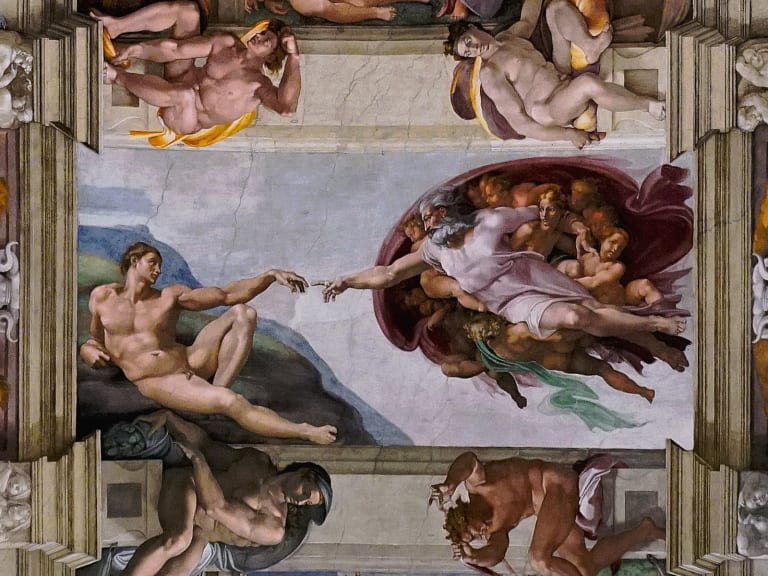
As I indicated, to access the Sistine Chapel you will need to have a ticket to the Vatican Museums: it is best to book online and in advance, to avoid queues and make sure you get availability at the best price. On Hellotickets you will find the cheapest guided tours in English and you will have the option to cancel the ticket or the tour if you have an unforeseen event.
Can I buy tickets for the Sistine Chapel at the ticket office?
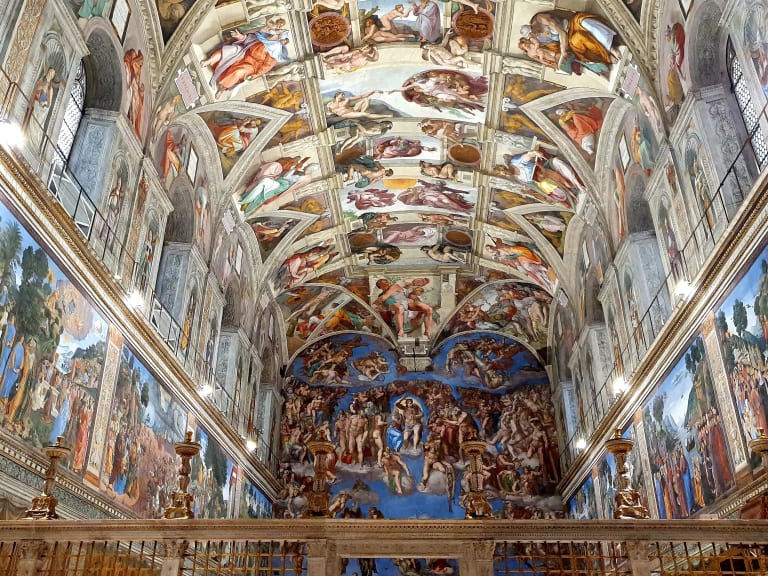
Tickets can be purchased at the Vatican Museums and Sistine Chapel ticket office, but I do not recommend this at all. The queue is so long that it literally goes around the Vatican walls (you will see it if you ever walk around and it will really catch your attention to see such a long queue). My advice is to buy them online and in advance to make sure you have a slot on the day and time you decide.
Free visit to the Vatican Museums

For a visit on your own, buying online your ticket to the Vatican Museums and the Sistine Chapel is the best option. You will avoid waiting in line to enter this busy tourist attraction, whose crowds are the only thing that can spoil your experience.
You will have priority access to the Vatican Museums, at the entrance of which you will receive a map and a short orientation on the recommended tour, and you will be able to enter the Sistine Chapel and Raphael's Rooms.
With these tickets, you can stay in the Vatican Museums for as long as you want to visit the rooms at your own pace.
I recommend it if... you want to avoid tour groups and you don't need a guide to visit the Vatican Museums.
Visit the Vatican with a premium early access ticket
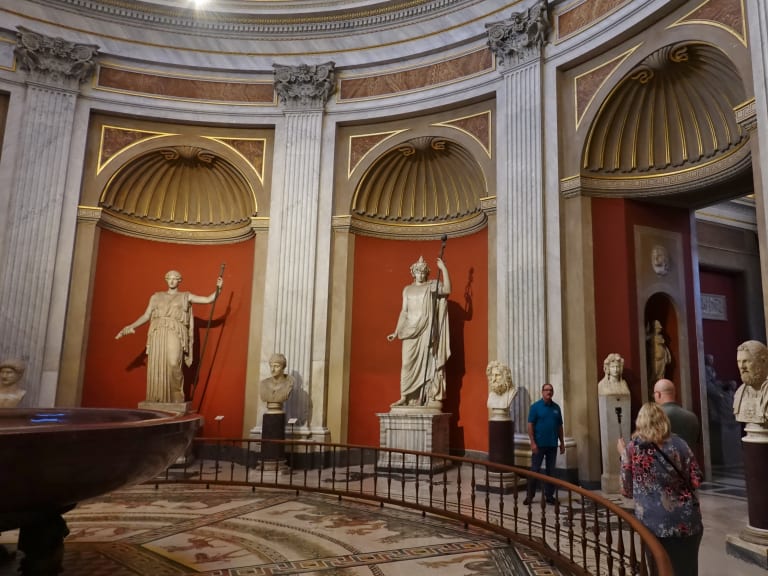
If you are looking for the premium experience to visit the Sistine Chapel, this is it. This is a tour of the Vatican City, with the particularity that you will enter the Vatican at dawn, avoiding the crowds and exploring this impressive place in the exclusive company of your group.
As you can imagine, the Sistine Chapel is one of the most visited tourist attractions in the world, so avoiding the crowds and admiring it in peace will totally change your experience.
I recommend it if... you are looking for the perfect Sistine Chapel experience, to avoid the crowds of tourists and tour the Vatican at first light.
How to skip the lines to enter the Sistine Chapel?
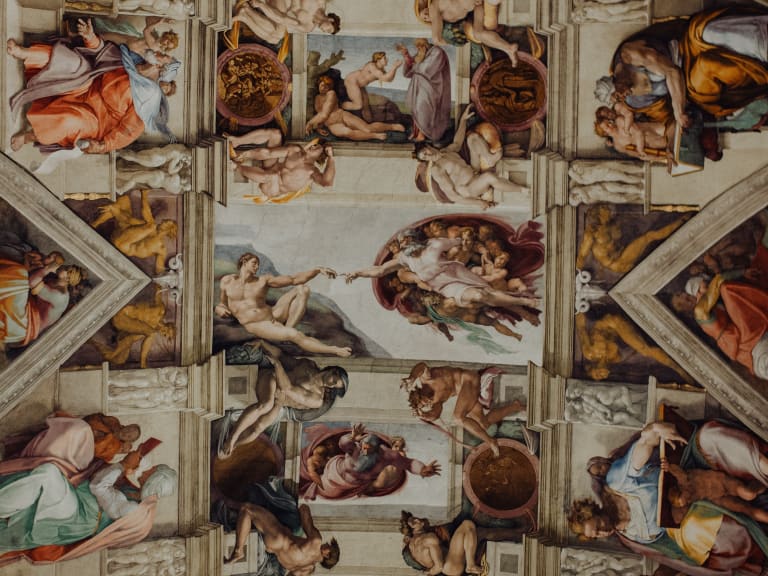
The queues to access the Vatican Museums and the popular Sistine Chapel can last several hours, something that undoubtedly complicates the enjoyment of the experience.
Therefore, it is best to buy tickets online, avoid going to the ticket office and when booking, take an option that guarantees you will skip the queues. For example, with this guided tour of the Sistine Chapel, the Vatican Museums and St. Peter's you will have direct access without having to wait.
What are the Sistine Chapel opening hours and the best time to visit?
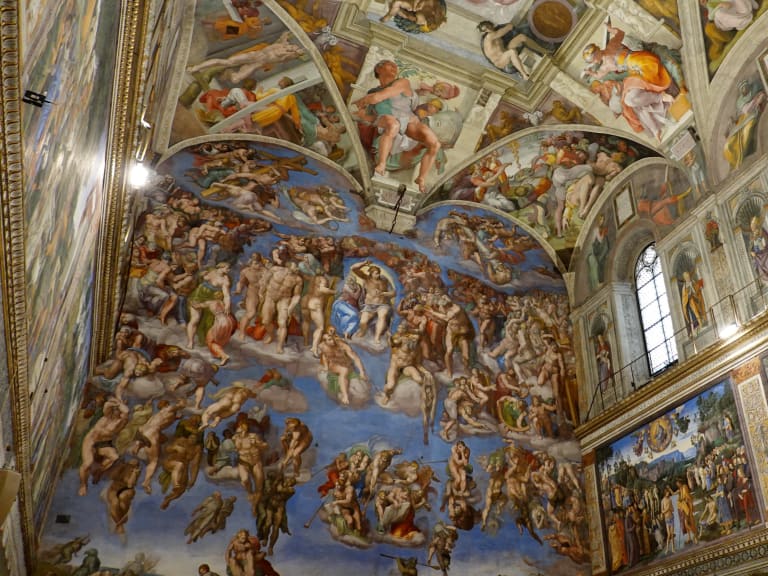
Here is all the information you need to know about the opening hours for your visit.
- Monday to Saturday from 9:00 am to 6:00 pm.
- The last entrance is at 4:30 p.m. and around 5:30 p.m. all the people who are visiting the Vatican start to leave.
- The best time to visit the Sistine Chapel is early in the morning, either with an Early Bird tour or at the first entrance after opening.
- It is usually less crowded on Thursdays and Fridays.
- You can also visit the Vatican Museums just before closing to avoid the crowds, but you risk being closed before completing your visit.
- On the last Sunday of each month, the Vatican Museums and Sistine Chapel are open from 9 am to 2:30 pm, with last entry at 12 noon. On this day, the entrance to the Sistine Chapel is free, so it can be a good option if you are on a tight budget, but I do not recommend it as the queues to enter and the crowds are monstrous.
- A very nice experience can be to visit the Vatican Museums at night. They are open on Fridays from 7pm to 11pm, from mid-April to the end of October.
Tips for visiting the Sistine Chapel
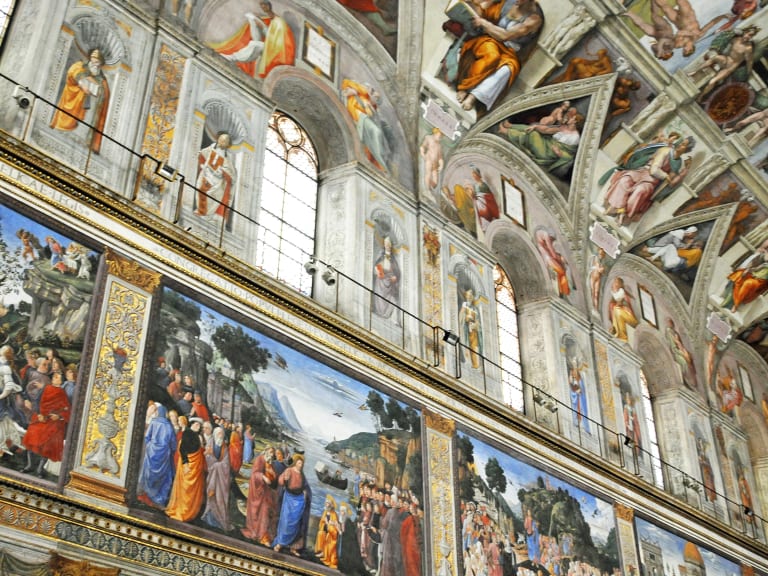
Here are some tips I learned on my visit to the Sistine Chapel that will help you save time and tour the vastness of the Vatican as if you had already been there.
How to find the Sistine Chapel
To get to the Sistine Chapel as soon as you enter the Vatican, go up the escalators and turn left and you will reach the courtyard of the Pineapple Courtyard. Go through the courtyard and turn left, where you will find a flight of stairs.
Go through the octagonal courtyard, and into the Round Room, where you will see Nero's bathtub. Now turn left, go through the room of Constantine's tomb, go up the stairs, head to the Hall of Tapestries and go straight ahead until you find the Sistine Chapel.
Attire and photographs
To visit a place whose nickname is the Holy See, you know you have to wear appropriate attire (as you do for so many other places of worship in Rome, so for your visit to the Sistine Chapel you'll be used to it by now). Knees and shoulders must be fully covered, even in summer. My advice is to wear a light sweater that you can easily put on.
And no, you can't take pictures inside the Sistine Chapel for several reasons, especially to avoid a possible flash spoiling the frescoes that decorate it. The guards are very attentive to this, and will yell at you if they see you taking pictures, either with a camera or with your cell phone, and if they catch you several times they can even throw you out of the room. So you know, enjoy your visit and admire with your own eyes the breathtaking beauty in front of you.
What you should know before booking your ticket to the Sistine Chapel?
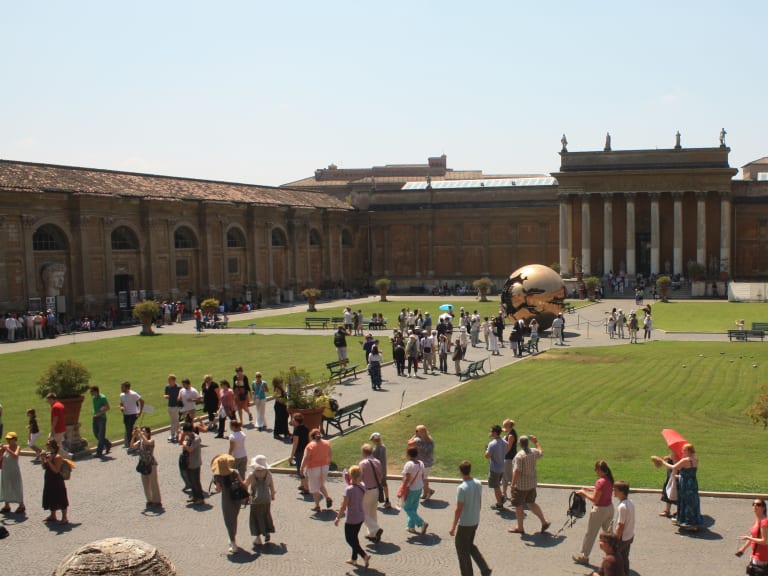
- When you book your tickets or tour, you will receive a confirmation email at the address you have provided. My advice is to open it to check that everything is correct and keep it in prominent mails, to have it handy at the access to the Vatican or at the meeting point with your guide.
- You can get a 100% refund if you want to cancel the experience, but be careful because only if you make the return 24 hours before the day of the experience. To return your tickets or cancel the tour, go to the email and look for the instructions.
- On Wednesdays you cannot enter St. Peter's Basilica because it is the day of the papal audience. My advice is to book for any day other than Wednesday, so you can include this visit in your tour of the Vatican.
- If you have purchased or plan to purchase the Omnia Card, keep in mind that it includes entrance to the Vatican Museums, so you can save yourself from having to buy it separately. However, if you want to take a tour you will have to book it separately.
History of the Sistine Chapel
The Sistine Chapel was built between 1473 and 1481 under the direction of Pope Sixtus IV. The initial purpose was to be a private papal chapel and also a venue for important Vatican events.
The initial design and construction was commissioned to architects known as Giovanni de Dolci. Artists such as Botticelli, Perugino, Ghirlandaio and Cosimo Rosselli participated in its decoration.
In 1508 an important artistic renovation took place when Pope Julius II commissioned Michelangelo to paint the dome. A Renaissance masterpiece that took four years to complete, it covers more than 500 square meters and depicts about 300 figures.
Description of the main works of the Sistine Chapel
The ceiling of the Sistine Chapel was painted by Michelangelo between 1508 and 1512. The dome is decorated with biblical scenes. In the center of the dome are nine main panels that narrate key episodes from the Book of Genesis:
- The Separation of Light from Darkness.
- The Creation of the Stars and Plants.
- The Separation of the Waters and the Earth.
- The Creation of Adam.
- The Creation of Eve.
- The Original Sin and the Expulsion from Paradise.
- The Sacrifice of Noah.
- The Universal Flood.
- The Drunkenness of Noah.
In addition, it emphasizes The Last Judgment that, painted by Michelangelo between 1536 and 1541, is located in the wall of the altar and shows the Final Judgment of Christ on the humanity. Other Renaissance frescoes: Before Michelangelo, artists such as Botticelli, Perugino and Ghirlandaio painted frescoes on the life of Moses and Christ.
- Sandro Botticelli is the author of scenes such as The Trials of Moses and The Temptation of Christ.
- Domenico Ghirlandaio painted scenes such as The Calling of the Apostles.
- Pietro Perugino painted frescoes such as The Giving of the Keys to St. Peter.
Religious and artistic significance of the Sistine Chapel
The Sistine Chapel is a profoundly Christian space. Each of the frescoes reflects essential concepts of the Christian faith, such as:
- Creation: The Creation of Adam, located on the ceiling, reflects the touch of God and Adam's fingers.
- Sin and the Fall: The Original Sin and the Expulsion from Paradise.
- Redemption and Judgment: In Michelangelo's The Last Judgment.
In addition, the Sistine Chapel is the site of the papal conclaves, where the cardinals lock themselves in to deliberate and pray.
Restoration Details
The Sistine Chapel has undergone major restorations carried out between 1980 and 1994 in order to clean and preserve the frescoes painted by Michelangelo, Botticelli and Perugino, among others.
The aim was to remove soot and dirt, reveal the original colors and repair cracks and structural damage
Today, the temperature, humidity and air filtration control system has allowed the Sistine Chapel to be in an optimal state of conservation.
What else to see in the Vatican Museums?

Here are the rooms that impressed me the most during my visit to the Vatican Museums in no particular order, just for your reference. In total, to see everything first thing in the morning and without particular haste, it took me about 3 hours.
- Vatican Pinacoteca: This palace houses more than 400 works of art by painters such as Giotto and Fra Angelico, leading exponents of the early Renaissance, and Raphael, Leonardo da Vinci and Caravaggio.
- Collection of contemporary religious art: Throughout 55 rooms you can find about 800 works by artists such as Chagall, Dali, Gauguin, Kandinsky and Van Gogh, something I definitely did not expect to find in the Vatican.
- Museo Pio-Clementino: There are several rooms dedicated to the exhibition of Greek and Roman sculptures, some of them very famous like the Apollo of Belvedere, the Apoxymene or the Aphrodite of Cnido. I especially recommend you to take a walk here.
- Gregorian Egyptian Museum: Here are kept archaeological remains and works of art from Egyptian, Assyrian, Mesopotamian and other ancient cultures, mainly from Hadrian's Villa in Tivoli.
- Raphael's Rooms: The most important visit in the Vatican Museums after the Sistine Chapel. There are 4 rooms displaying frescoes by Raphael and members of his school.
- Hall of the Immaculate Conception: A room entirely decorated with frescoes dedicated to the life of the Virgin Mary.
- Gallery of Maps: This houses what is probably the largest cartographic collection in the world, displayed on the walls of an impressive gallery.
- Sistine Chapel: I don't think you'll forget to visit the Sistine Chapel on your visit to the Vatican Museums, but since stranger things have been seen here to close the list just in case.
Other worthwhile experiences in Rome

Not everything in Rome is about visiting its monuments and historic buildings. There are many people who focus on all the places they must enter and all the must-see attractions, only to realize at the end of their trip that they missed what really mattered: getting to know the city.
So that you don't miss anything, I leave you with an article that will guide you in choosing the best tour of Rome, an experience I highly recommend: Top 11 tours of Rome. And although they do not have the splendor and immensity of the Vatican's exhibition halls, the Capitoline Museums are a worthwhile visit that is not usually included in the most typical tourist circuits.
If you want to read more about this museum, I have written a guide that may help you when planning a visit: Capitoline Museums in Rome: Tickets and Tours. Also, remember that you can also buy a ticket in which in addition to the Vatican Museums and the Sistine Chapel, you can visit the Colosseum and the Roman Forum.










